SanDisk Ultra II (240GB) SSD Review
by Kristian Vättö on September 16, 2014 2:00 PM ESTRandom Read/Write Speed
The four corners of SSD performance are as follows: random read, random write, sequential read and sequential write speed. Random accesses are generally small in size, while sequential accesses tend to be larger and thus we have the four Iometer tests we use in all of our reviews.
Our first test writes 4KB in a completely random pattern over an 8GB space of the drive to simulate the sort of random access that you'd see on an OS drive (even this is more stressful than a normal desktop user would see). We perform three concurrent IOs and run the test for 3 minutes. The results reported are in average MB/s over the entire time.
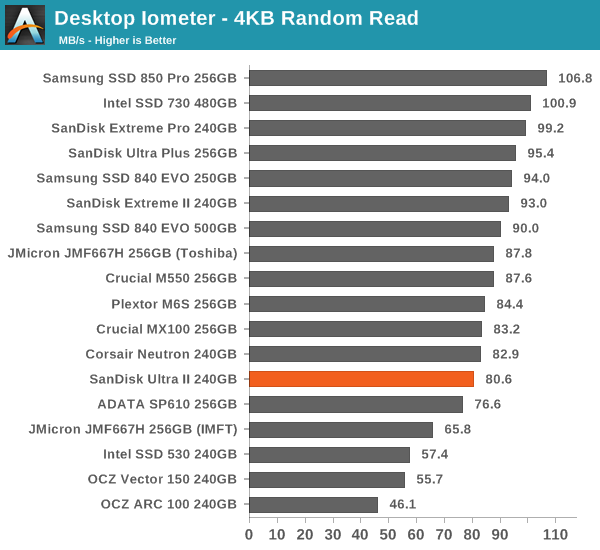
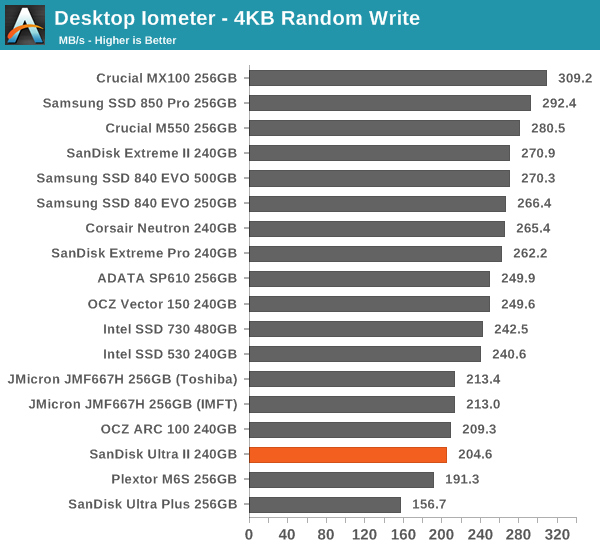
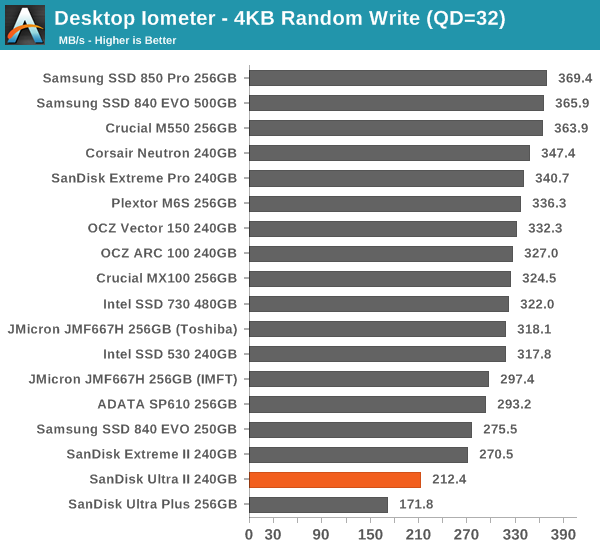
Random performance is decent but not overwhelming. I am surprised that the Ultra II is not faster considering the SLC cache that nCache 2.0 provides. Random write performance especially is a bit slow by today's standards and does not scale with queue depth, but for light client usage the Ultra II should still be fine.
Sequential Read/Write Speed
To measure sequential performance we run a 1 minute long 128KB sequential test over the entire span of the drive at a queue depth of 1. The results reported are in average MB/s over the entire test length.
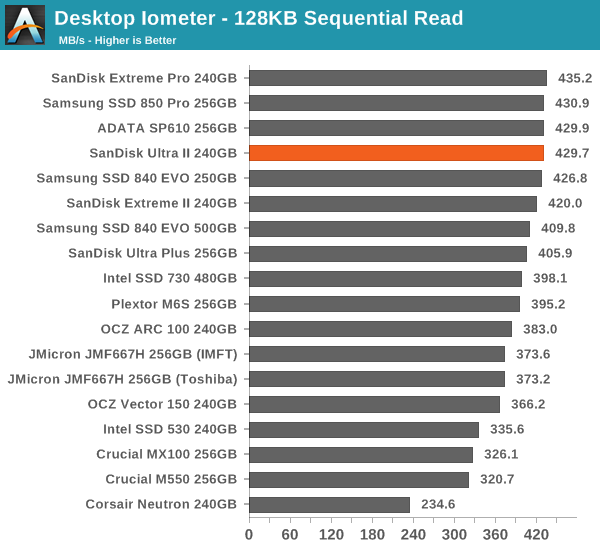
Fortunately sequential read performance is much better, although sequential write performance gets handicapped due to TLC, similar to the 840 EVO.
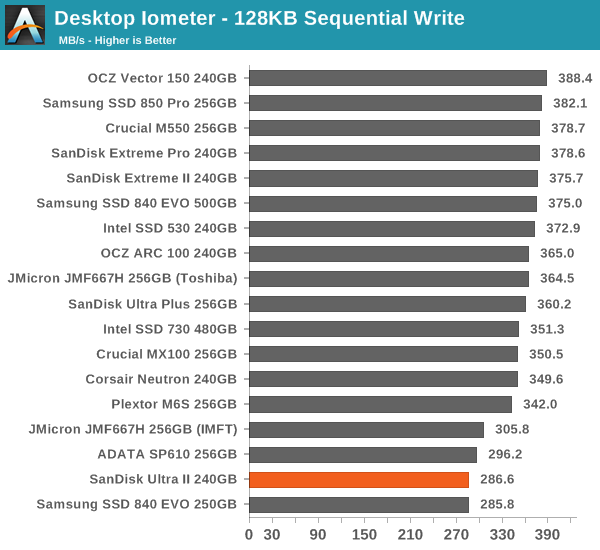
AS-SSD Incompressible Sequential Read/Write Performance
The AS-SSD sequential benchmark uses incompressible data for all of its transfers. The result is a pretty big reduction in sequential write speed on SandForce based controllers, but most other controllers are unaffected.
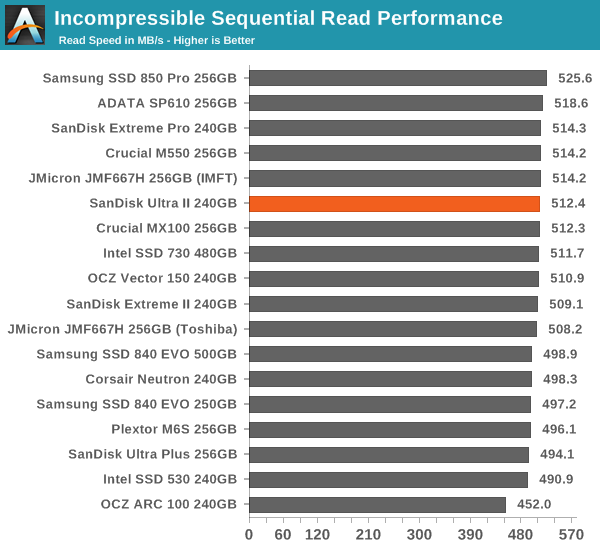
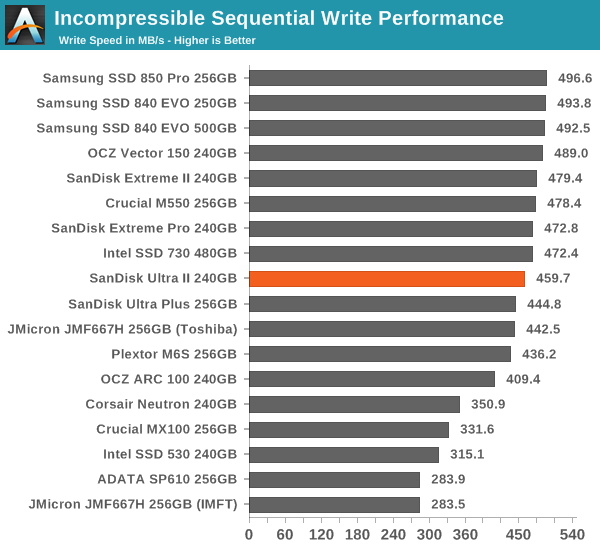










54 Comments
View All Comments
hojnikb - Thursday, September 18, 2014 - link
Some people with 840 basic are also reporting slow read..CrazyElf - Tuesday, September 16, 2014 - link
Factoring in the power loss protection and the fact that you get MLC, albeit at 16nm, I'd say that the MX100 represents a superior drive to this SSD. Oh, and the Ultra II does not support encryption.Arguably none of these shortcomings would be a problem for a consumer based drive for the average user, but this drive brings no real advantages over the MX100 in terms of pricing, performance, etc, and several drawbacks.
sweeper765 - Tuesday, September 16, 2014 - link
I wouldn't rush into buying a TLC based drive right now, seeing the problems 840 EVO series is having.There are hundreds of users reporting heavy read speed degradation of old written data, reaching only 50mb/s or even 2-3 mb/s in the most extreme cases. Might be a firmware bug but also could be a TLC issue. Who knows?
http://www.overclock.net/t/1507897/samsung-840-evo...
http://forums.overclockers.co.uk/showthread.php?t=...
NA1NSXR - Tuesday, September 16, 2014 - link
So basically a wash, or even arguably a slight loss against 840 EVO, with 850 EVO on the horizon. I don't know if I would've personally given it a "Recommended by Anandtech".Kristian Vättö - Wednesday, September 17, 2014 - link
The 840 EVO is more expensive and not just marginally. While the 850 EVO is coming and may very well be the best value drive when it does, at this point it is just another product in the pipeline. Making recommendations based on a future product that may or may not be faster wouldn't be far in my opinion.Gigaplex - Wednesday, September 17, 2014 - link
The only reason I'd consider a TLC drive over an MLC drive is if it was significantly cheaper than competing MLC drives. It's no cheaper than MX100 at 512GB and below, and not that much cheaper than M550 at 1TB. At 50% higher bit density per cell, I was hoping for ballpark 33% cost reduction.hojnikb - Wednesday, September 17, 2014 - link
Sadly, it doesn't work like that. Even though it has TLC, most consumers won't care. Sandisk obviously positioned the drive in a price bracked, similar to competition.rtho782 - Wednesday, September 17, 2014 - link
In most of these reviews I see complaints about lack of encryption support.Why would I, as a home user, want to encrypt my drive? Does it not require additional software and/or motherboard support and mean I can't move the drive to another PC?
I know businesses like to encrypt their laptops, but I don't understand how encryption would benefit me.
jabber - Wednesday, September 17, 2014 - link
Unless you really need it for business/legal needs then encryption is a liability in terms of you screw up your drive and then you want to pull any data off it. Certainly never encrypt a drive you use for testing/tweaking/overclocking a PC with thats asking for trouble. If you have a porn collection you want to hide then simply use encrypted file containers. Much safer than full disk for the average Joe. Even those that need encryption by law often don't actually have data worth looking at but it's there to save embarrassment. In 99.9% of cases encryption is only needed to stop the guy that found or stole your laptop looking at what's on there for 2-3 mins before a dodgy copy of Windows 7 or Linux is slapped over the top and the laptop is sold on.Kristian Vättö - Wednesday, September 17, 2014 - link
Our readership is much more than just home users. Many IT managers come to AnandTech to aid their hardware buying decisions, so we want to cater more than just the typical enthusiast needs. Besides, hardware encryption is still a feature after all -- whether you need is up to you like I mentioned in the review. Since some drives in the same price segment have it and others don't, I think it is something that should be noted because having it is better than not having it in any case, even if you don't use as you never know if your needs change.